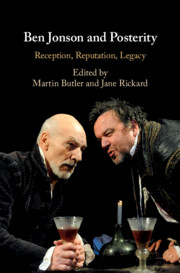Book contents
- Ben Jonson and Posterity
- Ben Jonson and Posterity
- Copyright page
- Dedication
- Contents
- Figures
- Contributors
- Acknowledgements
- Citations and Abbreviations
- Introduction: Immortal Ben Jonson
- Part I Conceptualizing Jonson
- Part II Jonson’s Early Reception
- Part III Jonsonian Afterlives
- Chapter 7 Anecdotal Jonson
- Chapter 8 Jonson in the Shadows
- Chapter 9 Adapting Jonson: Three Twentieth-Century Volpones
- Chapter 10 Jonson and Modern Memory
- Afterword Re-Making Jonson in the Digital World; or, Jonson, Our Contemporary?
- Index
Chapter 9 - Adapting Jonson: Three Twentieth-Century Volpones
from Part III - Jonsonian Afterlives
Published online by Cambridge University Press: 24 September 2020
- Ben Jonson and Posterity
- Ben Jonson and Posterity
- Copyright page
- Dedication
- Contents
- Figures
- Contributors
- Acknowledgements
- Citations and Abbreviations
- Introduction: Immortal Ben Jonson
- Part I Conceptualizing Jonson
- Part II Jonson’s Early Reception
- Part III Jonsonian Afterlives
- Chapter 7 Anecdotal Jonson
- Chapter 8 Jonson in the Shadows
- Chapter 9 Adapting Jonson: Three Twentieth-Century Volpones
- Chapter 10 Jonson and Modern Memory
- Afterword Re-Making Jonson in the Digital World; or, Jonson, Our Contemporary?
- Index
Summary
Following Stefan Zweig’s influential adaptation of Volpone in 1926, the twentieth century saw a slew of adaptations of Jonson’s great comedy. This essay focuses on three less familiar adaptations of Volpone, which follow Zweig’s particularly twentieth-century interest in the intersection of financial scams and power. First, Lionel Bart’s musical Wally Pone, King of Soho (1958), staged at London’s Unity Theatre and set in 1950s Soho. Second, the 1962 musical Foxy, which saw a Broadway run. This version eschews direct contemporaneity, instead relocating Jonson’s narrative to a remote area in the Yukon experiencing an economic bubble at the height of the 1896 Gold Rush. Third, Larry Gelbart’s Sly Fox, a farcical comedy first staged in 1976 at the Broadhurst Theatre, New York. This adaptation also stages the invalid trick among gold prospectors, this time in nineteenth-century San Francisco. Each of these versions involves a complex repurposing of the play, to make it speak to the experience of completely different audiences. The adjustments made in these three adaptations reveal considerable transformations in value and ideology, particularly around matters of social class and sexuality. Together they demonstrate Jonson’s robust and still powerful critique of a sexually rapacious and, above all, money-driven society.
- Type
- Chapter
- Information
- Ben Jonson and PosterityReception, Reputation, Legacy, pp. 193 - 213Publisher: Cambridge University PressPrint publication year: 2020

